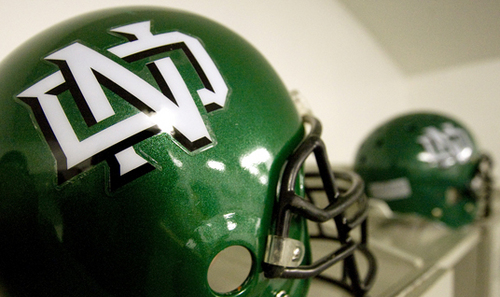Law enforcement officers have recently been busting college athletes who use steroids even when the steroid testing program administered by the National Collegiate Athletic Association (NCAA) has failed to detect the use of such drugs. Police in Grand Forks County recently uncovered anabolic steroids at the home of three players for the 2011 University of North Dakota football team.
Former Fighting Sioux football players Justin Belotti, Mitchell Goertz and Kenneth Watkins were arrested on steroid possession charges after the execution of a search warrant on December 15, 2011. The alleged steroid use by the players was not the reason for the search warrant.
One of the three players, Watkins, was targeted by police after law enforcement was tipped off by an informant. The informant told police that Watkins sold marijuana and Adderall. The police searched the garbage at his house and uncovered found trace amounts of marijuana along with Watkins’ Fighting Sioux football-player university identification card. This information served as the basis of a search warrant.
A search of Watkins’ house, which was shared by Belotti and Goertz, led to the discovery of anabolic steroids. Watkins quickly pleaded guilty to misdemeanor charges involving the possession of anabolic steroids. A judge sentenced him to ten days in jail with an eighty day suspended sentence, a $500 fine and one year of unsupervised probation. Belotti faces more serious charges involving Class C felony possession of anabolic steroids and Adderall; he has pleaded not guilty.
Last month, police discovered suspected anabolic steroids and/or human growth hormone (hGH) at the homes of three Colorado State University football players. Similar to the University of North Dakota case, the players involved have never failed any NCAA-administered steroid test. Also, the basis for the search warrant did not involve steroids.
CSU football players Mike Orakpo, Colton Paulhus were implicated in steroid use only because they brought attention to themselves from their involvement in an off-campus altercation. The fighting incident led police to obtain a search warrant seeking evidence related to the fight. The discovery of steroids was incidental. The players have all passed year-round, random steroid tests. Orakpo passed the steroid test as recently as last month according to his attorney.
The NCAA steroid testing program prohibits several classes of performance-enhancing and bodybuilding drugs including anabolic steroids, anti-estrogens, and peptide hormones such as human growth hormone (hGH) and IGF-1. The NCAA uses the National Center for Drug Free Sport (Drug Free Sport) to administer steroid testing to its athletes. They regularly catch a few dozen athletes that use steroids every year. But the effectiveness of steroid testing to detect steroid use has not been foolproof.

Source:
Grand Forks Herald. (May 3, 2012). Former UND football player pleads not guilty. Retrieved from http://www.grandforksherald.com/event/article/id/235704/group/homepage/

